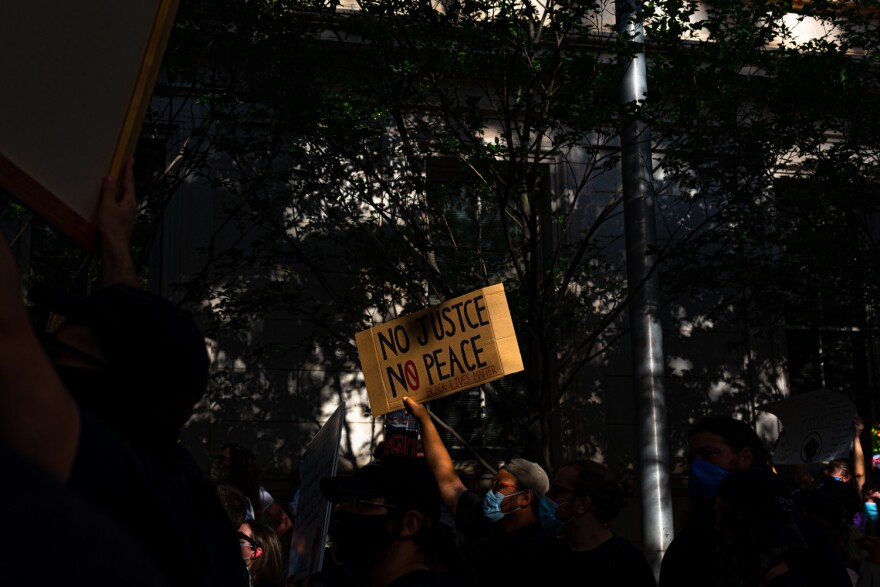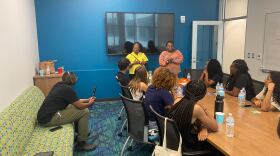Following the murder of George Floyd in 2020, around 14,000 people across the country were arrested, according to an analysis by the Washington Post.
I was one of those people. During one of those protests, I was detained during a mass arrest in Charlotte and charged with disorderly conduct and resisting arrest. Even though some of my charges were dropped, I still currently have one pending charge, and I still haven’t had my court date yet.
I believe my arrest was unjust and factually deficient — many legal and criminal justice representatives, like Staff Attorney Ian Mance, say it’s the same situation for many others arrested under the same circumstances.
“One thing that we observed when we got the 10,000-foot view of these arrests is, in a lot of instances, there really wasn't probable cause for the arrest of certain individuals,” Mance said.
Since 2013, Mance has worked with Emancipate NC representing individuals, community groups, and organizations in criminal and civil matters. Specifically, he's represented people in cases involving police use of deadly force. He now helps file civil suits for people who have been abused by police or unjustly arrested.

“There were a lot of situations where people were arrested en mass," Mance said. "It was like, 'if you're in the general vicinity, you’re going to jail.' That's just not the way the criminal law is supposed to work. That's not the way probable cause works.”
Many courts are still backed up due to the pandemic. And that means longer wait times for many. I recently visited the Durham County courthouse, and there were more than 60 people waiting in line for 20 minutes or longer.
As a result, most district attorneys like Spencer Merriweather from Charlotte-Mecklenburg County aren't tackling protest-related charges and other low-level misdemeanors.
“Often, many of the cases that are associated with the civil process in our community are class two misdemeanors and below,” Merriweather said. “Those just don't necessarily rise, at least at this point, to the best use of our core time.”
Often, he said the people whose charges last the longest or actually face conviction are the people that are most economically, politically, and socially vulnerable.
Activists who participated in the 2020 protests in North Carolina say they experienced long-standing consequences as a result of being arrested. Many of them have never been charged, convicted, or seen by a judge. For people like Ash Williams, this delay makes it difficult to get jobs, benefits, and other basic necessities.
“I have had issues individually with applying for housing. The criminal background check is done. The charges that I have not been in court for over a year now, they pop up, and then the application is rejected,” Williams said. “I know that that has been the experience for some of my friends who are also defendants.”

I worked closely with Williams and other organizers of Charlotte Jail Support in 2020. Jail Support was a community initiative where members who supported the protests in Charlotte also gave out food, bus passes, clothes, and booked hotel rooms for individuals coming out of jail. After 160 days, the Mecklenburg Sheriff's Office officially disbanded Jail Support and arrested about 25 of its supporters.
“So the first thing that I want to say is that the state has criminalized mutual aid, period,” Williams said. “That is why people have charges— because mutual aid has been criminalized. Because giving a bus pass out has been criminalized.”
Williams was later arrested for assault on a government employee in March 2021, as a result of the 2020 protests. When I spoke to Williams, he continued to unpack the trauma that this experience has had on his well-being.
“I have to defend myself and prove to the police that I'm a disabled person. They're saying that I kicked them twice in the neck and in the chest. I couldn't have done it if I wanted to,” Williams said. “One of the things that I'm having to do is wonder about when I'm going to have an opportunity for any kind of justice.”
Despite the fact that he has not gone to court in over a year, his pending charges are still affecting his life. At the time of the protests, Williams was an adjunct professor in the Women and Gender Studies department at the University of North Carolina Charlotte. He was teaching classes on the impact of the prison-industrial complex on Black, queer, and transgender people.
In the midst of the protest, Williams was asked to submit a background check, despite having already submitted one when he was hired. When the background check came back, he was told he could no longer continue teaching. Williams was surprised but remained unapologetic about his activism.
“I do want my students to know, and the other members of the campus community to know, that I move up, I sit up, for what I believe in,” said Williams. “The things that I'm talking about in class, that's what I'm doing outside. That's what I'm doing in the streets.”

Williams’ first court date won’t happen until November, so in the meantime, he continues working as an organizer on issues like racial, reproductive, and environmental justice.
Jamie Marsicano was also one of the organizers I worked with from Jail Support. Marsicano’s charges from the 2020 protest were recently dropped after a year. These days, Marsicano is a law student at the University of North Carolina Chapel Hill and was also an organizer for Jail Support. She sees herself as lucky compared to the other activists with pending charges.

“I think part of the reason my [charges] got dropped is because I am kind of known as an organizer in Charlotte, and also because I had the privilege of my arrests being on camera,” Marsciano said. “So you could actually see very easily that what I was being accused of did not happen and that, in fact, I was the one who had been assaulted. And so that's why it is really important to me to continue to fight for the folks who don't have those kinds of privileges in this case.”
Marsicano is currently leading a campaign to secure pro-bono legal support for the 35 people in Charlotte who still have pending charges from the 2020 protests.
“Our philosophy in Charlotte is that the action is not done until everybody is home, and all of their charges are dropped,” said Marsicano. “If you think of it that way, we are still in the 2020 protests in response to George Floyd's murder.”
What Marsicano expressed, really hit home. My case has been rescheduled multiple times, and it is currently on the docket for December 27. It is very unlikely that my case will be resolved that day. That means my pending charge will likely still appear on background checks and continue to make it difficult for me to obtain housing or work. Many of the people I interviewed who are also in this gray area shared a similar view of what should happen next. When I asked Ash Williams he gave me his ideal solution.
If the state can’t get it together by a certain amount of time… they need to let it go. They need to drop people’s charges,” Williams said.








